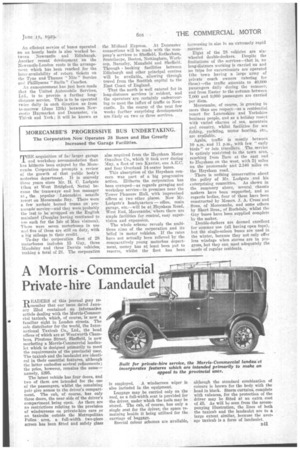MORECAMBE'S PROGRESSIVE BUS UNDERTAKING.
Page 67

If you've noticed an error in this article please click here to report it so we can fix it.
The Corporation Now Operates 28 Buses and Has Greatly Increased the Garage Facilities.
THE acquisition of far larger garage and workshop accommodation than has hitherto been enjoyed by the Morecambe Corpqration prompts a review of the growth of that public body's motorbus department It is scarcely three years since Mr. H. C. Ludgate (then at West Bridgford, Notts) became the tramways and bus manager
, the popular Lancashire seaside resort on Morecambe Bay. There were a few archaic horsed trams on promenade service—and they were probably the last to be scrapped on the English mainland (Douglas having continued to use such for the Isle of Man visitors). There were seven Motorbuses in use and five of these are still on duty, with a big mileage to their ,credit. .
To-day the corporation fleet of 28 motorbuses includes 15 Guy, three Maudslay and three Dennis vehicles, making a total of 21. The corporation also acquired from the Heysham Motor Omnibus Co., which it teok over during May, a fleet of two Karrier, one A.E.C. and four Overland 14-seater buses.
This absorption of the Heyshans concern was part of a big progressive action. Hitherto the corporation has been cramped--as regards garaging and workshop service—An premises near the Tower Pleasure Hall, with improvised offices at two other places. Now Mr. Ludgate's headquarters — office, main garage, etc.---will be at Heysham Road, West End, Morecambe, where there are ample facilities for control, easy supervision and expansion. .
The whole scheme reveals the ambitious aims of the corporation and its belief in motor vehicles. If the rates have not actually been relieved by the comparatively young motorbus depart, ment, money has at least been put to reserve, whilst the fleet has been




















































































































